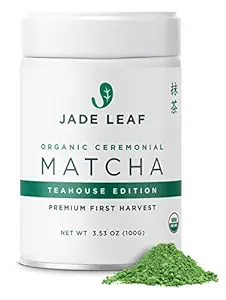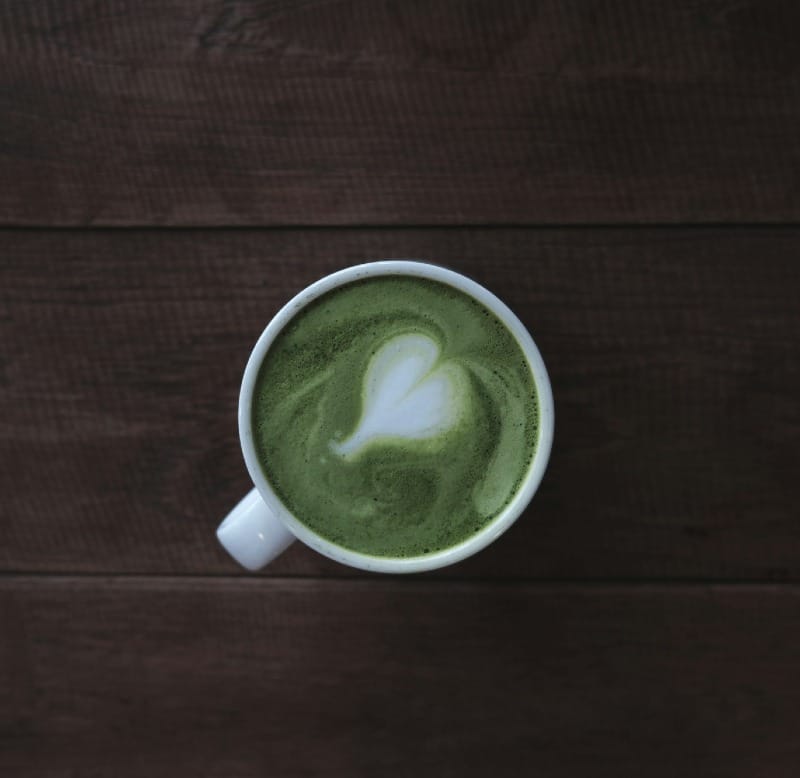Matcha has become a trendy alternative to coffee, prized for its unique flavor and potential health benefits. But how does its caffeine content really compare to other caffeinated beverages? Let's dive into the science behind matcha's energizing effects and what sets it apart.

Key takeaways:
• Matcha typically contains 19-44 mg caffeine per gram of powder
• The caffeine in matcha is released more slowly due to L-theanine
• Matcha provides a calmer, longer-lasting energy boost than coffee
Matcha tea caffeine content: The basics
Matcha is a finely ground powder made from specially grown and processed green tea leaves. Unlike regular green tea where the leaves are steeped, with matcha you consume the entire leaf, resulting in a more concentrated dose of caffeine and other compounds.
The caffeine content of matcha can vary based on factors like:
• Growing conditions
• Processing methods
• Preparation technique
On average, matcha contains 19-44 mg of caffeine per gram of powder[1]. A typical serving of matcha uses 2-4 grams of powder, resulting in approximately 38-176 mg of caffeine per cup. For comparison, an 8 oz cup of coffee contains about 95 mg of caffeine on average[2].
Matcha green tea caffeine content vs. other teas
While matcha is made from the same plant as other green teas (Camellia sinensis), its caffeine content tends to be higher due to how it's grown and prepared. Here's how matcha stacks up against other teas:
• Matcha: 19-44 mg caffeine per gram
• Regular green tea: 12-29 mg caffeine per gram
• Black tea: 22-28 mg caffeine per gram
• Oolong tea: 12-55 mg caffeine per gram[3]
The exact caffeine content can vary widely between brands and preparation methods. However, matcha generally provides more caffeine than other teas when comparing equal volumes of the prepared beverage.
Caffeine content in matcha: Slow-release energy
While matcha can contain as much or more caffeine than coffee, many people report experiencing a different type of energy boost. This is largely due to the presence of L-theanine, an amino acid found in tea leaves.
L-theanine has been shown to:
• Promote relaxation without drowsiness
• Improve focus and concentration
• Modulate the effects of caffeine[4]
The combination of caffeine and L-theanine in matcha results in a slower release of caffeine into the bloodstream. This provides a more sustained energy boost without the jitters or crash often associated with coffee.
Dr. Andrew Weil, a renowned integrative medicine physician, explains:
"The combination of caffeine and L-theanine in matcha has a synergistic effect, promoting alertness and concentration while reducing the anxiety and jitteriness that can come with caffeine alone."[5]
The unique benefits of matcha's caffeine content
Beyond its energizing effects, the caffeine in matcha may offer additional health benefits:
- Enhanced cognitive function: Studies suggest that the combination of caffeine and L-theanine in matcha can improve attention, reaction time, and memory[6].
- Increased fat oxidation: The caffeine in matcha may boost metabolism and enhance fat burning during exercise[7].
- Antioxidant boost: Matcha is rich in catechins, particularly epigallocatechin gallate (EGCG), which have potent antioxidant properties[8].
- Potential neuroprotective effects: Some research indicates that the compounds in matcha, including caffeine, may help protect against age-related cognitive decline[9].
Optimizing your matcha consumption
To get the most out of matcha's unique caffeine profile:
• Start with high-quality, ceremonial-grade matcha
• Use water just below boiling (around 175°F/80°C)
• Whisk thoroughly to ensure proper dissolution
• Experiment with serving sizes to find your ideal caffeine dose
• Consider consuming matcha earlier in the day to avoid sleep disruption
Remember, individual responses to caffeine can vary. It's always best to listen to your body and adjust your consumption accordingly.
Conclusion:
Matcha offers a unique approach to caffeine consumption, providing a balanced energy boost thanks to its combination of caffeine and L-theanine. While its caffeine content can be comparable to coffee, the overall experience tends to be smoother and longer-lasting. As with any caffeinated beverage, moderation is key to enjoying the benefits of matcha without unwanted side effects 🍵💚
Want to learn more about how matcha and other functional beverages can support your health and longevity journey? Explore our other articles on nutrition and wellness to stay informed on the latest scientific findings.
References:
- Kochman, J., Jakubczyk, K., Antoniewicz, J., Mruk, H., & Janda, K. (2021). Health Benefits and Chemical Composition of Matcha Green Tea: A Review. Molecules, 26(1), 85.
- U.S. Food and Drug Administration. (2018). Spilling the Beans: How Much Caffeine is Too Much?
- Chin, J. M., Merves, M. L., Goldberger, B. A., Sampson-Cone, A., & Cone, E. J. (2008). Caffeine content of brewed teas. Journal of Analytical Toxicology, 32(8), 702-704.
- Nobre, A. C., Rao, A., & Owen, G. N. (2008). L-theanine, a natural constituent in tea, and its effect on mental state. Asia Pacific Journal of Clinical Nutrition, 17 Suppl 1, 167-168.
- Weil, A. (2022). Matcha Tea: The Healthier Green Tea? DrWeil.com.
- Dietz, C., Dekker, M., & Piqueras-Fiszman, B. (2017). An intervention study on the effect of matcha tea, in drink and snack bar formats, on mood and cognitive performance. Food Research International, 99, 72-83.
- Willems, M. E. T., Şahin, M. A., & Cook, M. D. (2018). Matcha Green Tea Drinks Enhance Fat Oxidation During Brisk Walking in Females. International Journal of Sport Nutrition and Exercise Metabolism, 28(5), 536-541.
- Xu, P., Ying, L., Hong, G., & Wang, Y. (2016). The effects of the aqueous extract and residue of Matcha on the antioxidant status and lipid and glucose levels in mice fed a high-fat diet. Food & Function, 7(1), 294-300.
- Pervin, M., Unno, K., Ohishi, T., Tanabe, H., Miyoshi, N., & Nakamura, Y. (2018). Beneficial Effects of Green Tea Catechins on Neurodegenerative Diseases. Molecules, 23(6), 1297.
Citations:
- https://www.ncbi.nlm.nih.gov/pmc/articles/PMC7796401/
- https://www.textbuilder.ai/how-to-structure-an-article-for-maximum-readability/
- https://aicontentfy.com/en/blog/mastering-art-of-article-writing-best-practices-for-success
- https://matcha-karu.com/en/blogs/the-green-tea-blog-everything-about-matcha-green-tea-and-tea-culture/experiences-with-matcha-tea-a-comment
- https://www.wellandgood.com/how-much-caffeine-in-matcha/
- https://naokimatcha.com/blogs/articles/why-the-caffeine-content-in-matcha-beats-coffee
- https://coolinfographics.com/caffeine-poster
- https://www.sciencedirect.com/science/article/pii/S2665927122002180
- https://www.mdpi.com/2304-8158/13/8/1167














Member discussion